How to Stop Food Addiction

Food Addiction: A Complex Challenge
Food addiction is a multifaceted issue affecting millions, characterized by compulsive eating behaviors and a seemingly insatiable craving for certain types of food. These behaviors disrupt physical and mental health and often include a cycle of misuse similar to what is observed in substance abuse disorders. This article delves into the signs and symptoms of food addiction, its psychological underpinnings, and strategies for overcoming its powerful hold.
Recognizing Signs of Food Addiction
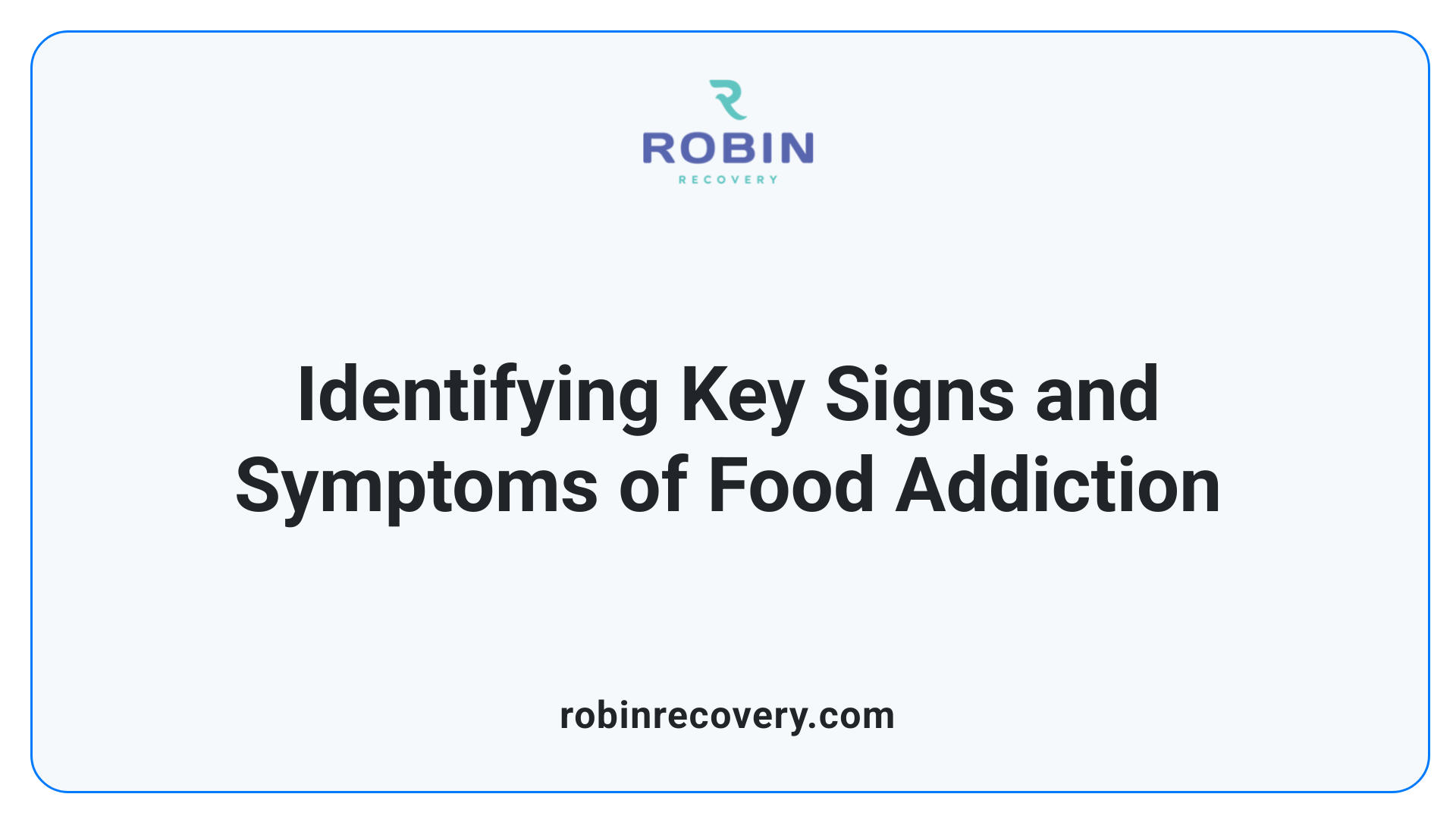
What are the signs and symptoms of food addiction?
Food addiction can be difficult to identify but specific signs and symptoms can help pinpoint an issue. Common indicators include:
- Frequent Cravings: Individuals often experience intense, persistent cravings for certain highly processed foods, particularly those rich in sugar, fat, and salt.
- Loss of Control: Many feel unable to resist these cravings, consuming larger amounts than intended. This loss of control can occur even when not physically hungry.
- Eating Despite Consequences: Individuals may continue to eat certain foods despite knowing that it negatively impacts their health and relationships, leading to feelings of guilt and shame.
- Negative Emotional Response: After eating, many report feelings of guilt, shame, or regret, often intensifying the compulsive cycle.
Additionally, signs may manifest through behaviors similar to those seen in substance use disorders. For instance, some individuals hide their food consumption or feel preoccupied with thoughts about food, paralleling actions observed in other addictions.
Relationship to other psychiatric issues
Food addiction doesn’t exist in isolation; it often coexists with other psychiatric situations. There is a significant overlap with obesity, where compulsive overeating leads to a cycle of emotional distress and further unhealthy eating patterns. Individuals may also struggle with binge eating disorder, characterized by episodes of excessive eating accompanied by feelings of guilt.
Both conditions highlight the complexity of food addiction, revealing that emotional and psychological factors are deeply intertwined with eating behaviors. Emotional distress, such as anxiety and depression, can drive individuals to seek comfort through food, establishing a detrimental feedback loop that exacerbates addiction-like symptoms. As a result, professional support from therapy or nutritional guidance is often recommended to tackle both the eating disorder and the underlying emotional issues.
Exploring Emotional and Psychological Roots
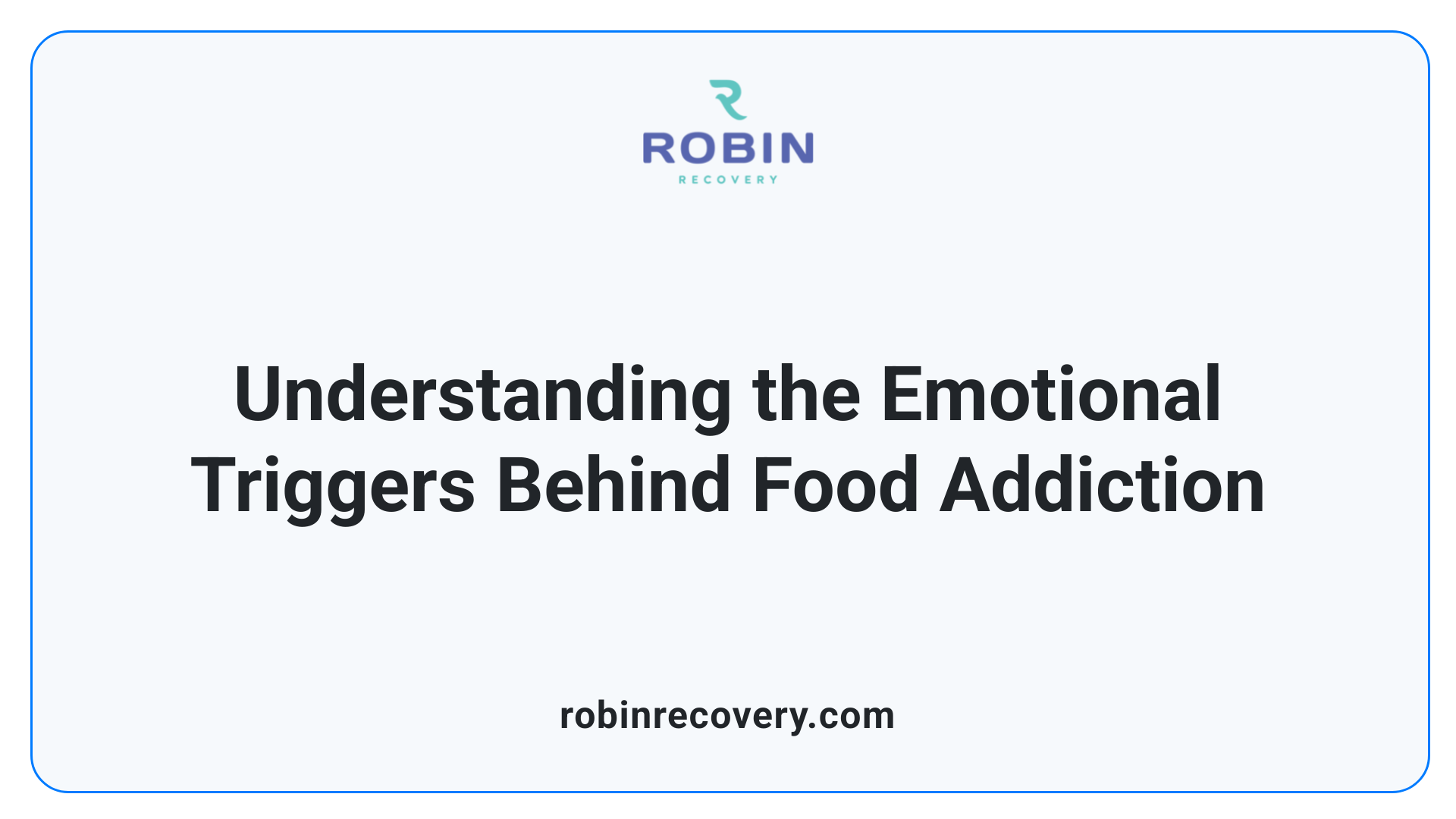
What psychological and emotional factors contribute to food addiction?
Food addiction typically involves complex emotional and psychological factors. Many individuals facing this issue often have a history of trauma or prolonged stress, which can lead to a reliance on food as a coping mechanism. When distressed, people may turn to highly palatable foods, seeking comfort and relief from negative emotional states like depression and anxiety. This reliance can become compulsive, as the urge to eat does not necessarily correlate with actual hunger.
Chronic stress disrupts hormonal balance in the body, enhancing cravings for foods high in sugar, fat, and salt. These highly palatable foods activate the brain's reward system, releasing dopamine and creating a cycle that mimics substance addiction. Therefore, the pleasure received from these foods temporarily alleviates emotional pain, reinforcing the behavior.
Moreover, genetic predispositions play a significant role in food addiction. Some individuals may inherit traits that affect impulse control, making it more challenging to resist compulsive eating. Additionally, those with mood disorders, such as anxiety or depression, may find themselves more susceptible to using food as a way to self-soothe or manage their emotions.
This interplay of psychological influences and genetic tendencies constructs a feedback loop, where emotional distress triggers cravings for certain foods while the consumption of these foods leads to further emotional issues, ultimately fostering a cycle of food dependence.
Understanding these emotional triggers is crucial in addressing food addiction, as resolving underlying psychological issues can pave the way for healthier relationships with food.
Strategies for Managing Food Addiction
How can I manage and overcome food addiction?
Managing and overcoming food addiction involves a combination of practical strategies aimed at fostering a healthier relationship with food. First and foremost, establishing regular meal patterns can help combat the urge to binge. Skipping meals can lead to extreme hunger, increasing the likelihood of overeating during the next eating opportunity.
Incorporating snacks that focus on high-protein and high-fiber options between meals can help stabilize blood sugar levels and reduce cravings for unhealthy foods. Maintaining a balanced diet that includes plenty of fruits, vegetables, and whole grains is essential in keeping portions in check and preventing overeating.
What are the benefits of mindful eating?
Mindful eating plays a crucial role in managing food addiction. This practice encourages individuals to minimize distractions during meals, which helps in recognizing feelings of fullness. A useful tip is to wait at least 20 minutes before considering a second helping. This pause allows your brain to catch up with your stomach, helping prevent unnecessary overconsumption.
Additional Strategies
- Meal Planning: Preparing meals in advance can alleviate the temptation to reach for processed snacks.
- Identifying Triggers: Recognizing emotional triggers tied to eating can help address underlying issues that contribute to food addiction.
- Seeking Professional Guidance: Consulting with registered dietitians or joining support groups can offer community support and practical advice.
By implementing these strategies, individuals can work towards breaking free from the cycle of compulsive eating and achieving a more balanced approach to food.
Accessing Support and Treatment Options
What treatment options and support resources are available for food addiction?
Food addiction can be a challenging condition to navigate, but effective treatment options and support resources are within reach. Therapy stands out as a foundational element in addressing food addiction. One of the most successful approaches is Cognitive Behavioral Therapy (CBT). This method focuses on identifying triggers—whether emotional or environmental—and developing healthier coping mechanisms to manage cravings and change behaviors.
Support groups are also a vital resource. Organizations like Overeaters Anonymous and Food Addicts in Recovery Anonymous provide community-based support, allowing individuals to share their experiences and triumphs in a judgment-free environment. These groups can significantly aid in building motivation and accountability.
For those seeking professional help, various options exist. Individuals can utilize screening tools available from organizations such as the National Eating Disorders Association (NEDA), which help assess one's relationship with food. Treatment providers, including registered dietitians and psychologists, can be found both in-person and online. Financial assistance options may also be available for those who need it.
Medications like the FDA-approved Contrave can assist in managing cravings while supporting lifestyle changes. Structured nutritional counseling is another key aspect, promoting healthier eating habits tailored to the individual's needs.
Effective Interventions for Food Addiction
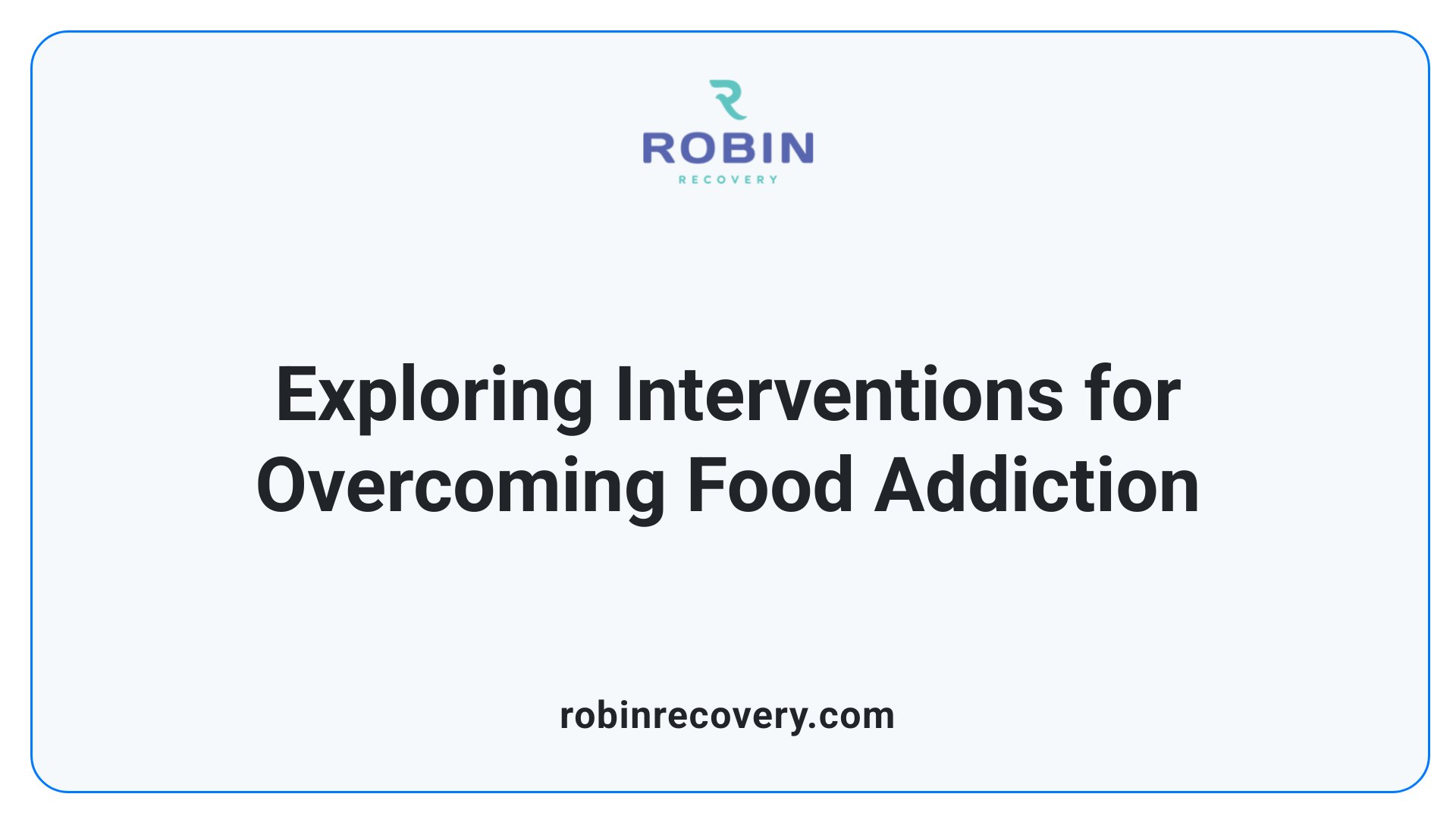
What are some effective interventions for addressing food addiction?
Effective interventions for addressing food addiction encompass several approaches that emphasize psychological support and lifestyle modifications. One prominent method is cognitive-behavioral therapy (CBT). This therapeutic approach helps individuals identify personal triggers related to their eating habits and develop healthier coping mechanisms. CBT can empower individuals by equipping them with strategies to alter detrimental thought patterns associated with food cravings.
In addition to CBT, participation in support groups such as Food Addicts in Recovery Anonymous (FA) or Overeaters Anonymous (OA) can provide essential social support. These groups allow individuals to share their experiences, fostering a sense of community and understanding that can be pivotal in recovery.
Medications like bupropion and naltrexone may also assist in managing addictive behaviors. These can be beneficial when combined with lifestyle changes aimed at improving nutritional habits and increasing physical activity levels. Structured programs, such as rehabilitation centers and commercial treatment options, offer comprehensive support systems designed to aid individuals as they navigate their challenges with food addiction.
How to implement lifestyle modifications?
Lifestyle modifications play a significant role in combating food addiction. Strategies may include:
- Planning meals to regulate hunger and prevent impulsive eating.
- Maintaining balanced diets, focusing on high-fiber foods that promote satiety and reduce cravings.
- Hydrating adequately to support overall health and control hunger signals.
- Removing trigger foods from home environments to decrease temptation.
- Staying active, as engaging in various activities can distract from cravings.
In summary, blending psychological interventions with practical lifestyle changes offers a multifaceted approach to managing food addiction effectively.
Understanding Food Cravings
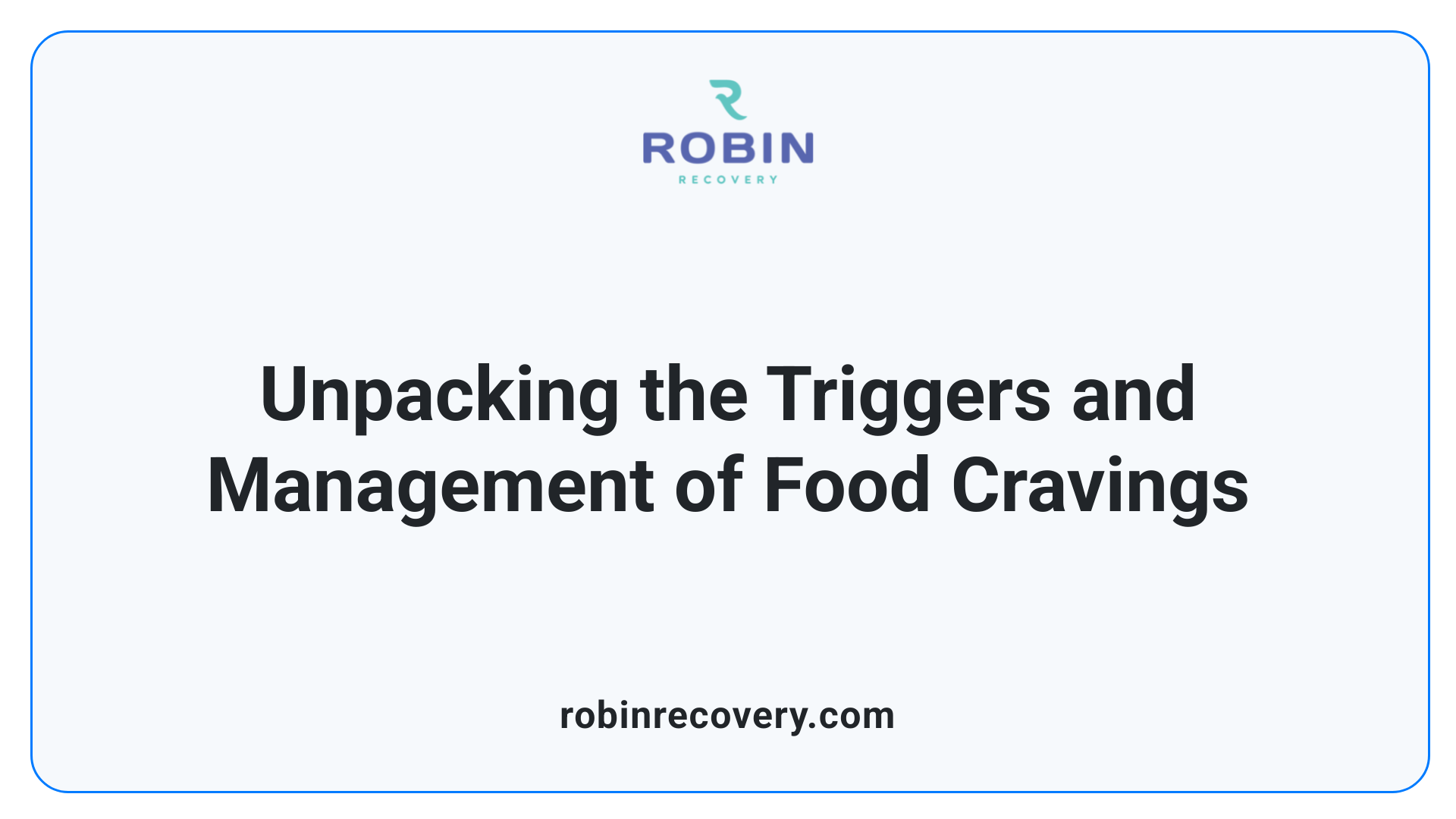
What triggers cravings?
Food cravings can arise from a mixture of biological, psychological, and environmental factors. Highly processed foods, particularly those rich in sugars, fats, and salts, can activate the brain's reward systems much like addictive drugs do. When consumed, these foods trigger the release of dopamine, the feel-good neurotransmitter, creating a cycle where individuals feel compelled to eat these foods repeatedly, even when not hungry.
Additionally, emotional triggers play a significant role. Situations involving stress, anxiety, or depression often lead people to seek comfort in food, a phenomenon known as emotional eating. This response can result in a pattern where food becomes a coping mechanism, further complicating one’s relationship with eating.
How can I reduce frequent food cravings?
To reduce frequent food cravings, start by ensuring you're eating regular, well-balanced meals that include lean proteins, whole grains, and plenty of fruits and vegetables, as this can help regulate hunger hormones. Stay hydrated, as dehydration can mimic hunger, and consider drinking a glass of water before meals to enhance feelings of fullness.
Practice mindful eating by waiting before indulging in cravings; this can help you determine if you're truly hungry or just experiencing a desire for specific foods. Managing stress through techniques like exercise can also help, as chronic stress can increase cravings for high-calorie foods. Lastly, prioritize getting enough sleep each night, as 7 to 9 hours can help maintain appetite balance and reduce cravings.
Debunking Myths about Food Addiction
Misconceptions in Diagnosis
Food addiction is often misunderstood, primarily because it lacks an official diagnosis in established mental health manuals like the DSM-5. This absence means that descriptions and experiences surrounding food addiction can differ widely, relying on subjective interpretations rather than standardized diagnostic criteria. According to a 2022 systematic review, insufficient evidence exists to classify food addiction as a formal condition. Critics argue that tools like the Yale Food Addiction Scale may overreach by suggesting it's akin to substance use disorders.
Differences from Other Disorders
It's essential to differentiate food addiction from disorders like Binge Eating Disorder (BED). While BED involves episodes of consuming large amounts of food quickly and often includes feelings of guilt, food addiction is characterized by continuous cravings and a compulsive drive toward specific foods, notably those high in sugar, fat, or salt. Emotional eating habits may contribute to food addiction, where individuals may use food as a coping mechanism for stress, rather than as part of a clinical disorder.
Overall, understanding these nuances can aid individuals in recognizing and addressing their relationship with food more effectively.
The Impact of Food Addiction on Health
What are the Physical and Emotional Tolls of Food Addiction?
Food addiction takes a significant toll on both physical and mental health. Individuals may experience severe health conditions such as obesity, diabetes, heart disease, and mental health disorders including anxiety and depression. The cycle of overeating followed by feelings of guilt can contribute to a negative self-image, exacerbating emotional distress.
Additionally, cravings for highly processed foods trigger dopamine release similar to other addictive substances. This cycle of dependency can lead to ongoing challenges with impulse control, making healthy habits harder to maintain.
How Does Food Addiction Compare to Substance Disorders?
Food addiction shares similarities with substance use disorders, particularly in terms of brain response and behavioral patterns. Just like drugs, food high in sugar, fat, and salt can induce cravings and activate pleasure centers in the brain, leading to compulsive eating behaviors. While food is essential for life, individuals struggling with food addiction find it similarly difficult to resist trigger foods, often resorting to obsessive thoughts and secretive eating.
This complex relationship highlights the need for multifaceted treatment approaches that consider both psychological and physical components, reminiscent of therapies used for substance abuse issues.
Building a Healthier Relationship with Food
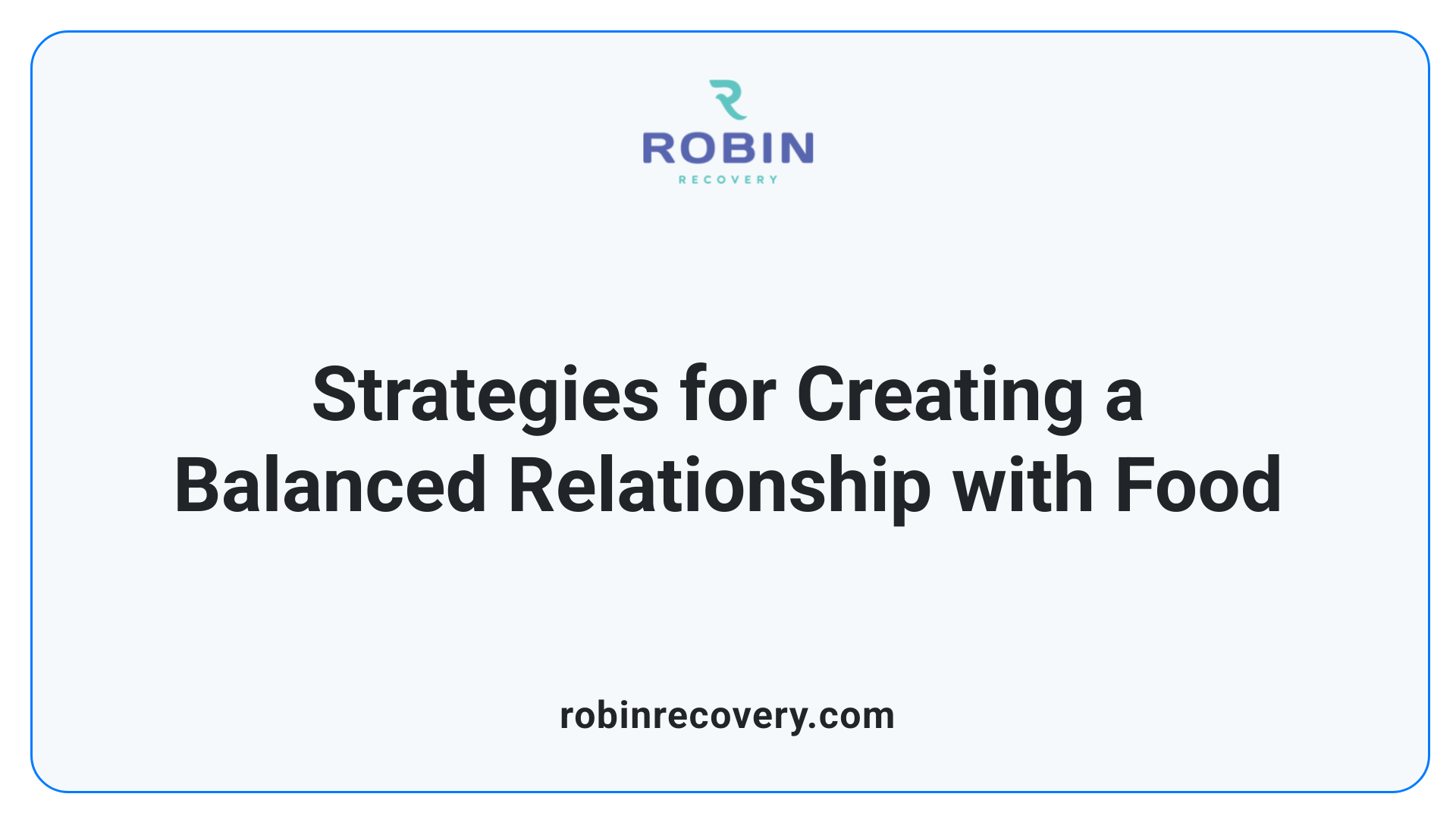
Exposure to 'Addicting' Foods
Food habituation involves regular exposure to highly palatable foods, which may help reduce the obsession surrounding these items. The idea is simple: by incorporating these foods without restriction, individuals might decrease cravings over time, leading to a more balanced relationship with food.
Strategies for healthy habituation include consuming trigger foods in moderation or pairing them with healthier options. This approach helps mitigate the psychological impact of feeling deprived, which can result in a binge-restrict cycle.
Creating Distance from Trigger Foods
Identifying and avoiding trigger foods is crucial in managing food addiction. Keeping these foods out of the house reduces the chances of reaching for them during moments of weakness.
Here are some effective practices to create distance from trigger foods:
- Meal Planning: Schedule meals and prepare them in advance to avoid impulsive decisions.
- Hydration: Drink water before meals to help reduce hunger and manage cravings.
- Engagement: Stay busy with activities to distract from cravings; consider joining clubs or exercising as a positive outlet.
Combining these strategies can foster a healthier and more fulfilling relationship with food.
Making the Change: Overcoming Food Addiction
Overcoming food addiction is indeed a challenging journey, demanding resilience, awareness, and support. By understanding the psychological and physiological underpinnings and leveraging the strategies and resources available, individuals can move towards a healthier relationship with food. Achieving this transformation is possible with the right mindset, dedication, and the support of professionals and peers committed to health and well-being.
References
- Get Help - National Eating Disorders Association
- Food Addiction Signs and Treatments - WebMD
- Food Addiction Treatment: Separating Myths from Reality
- How to Overcome Food Addiction - Healthline
- How To Overcome Food Addiction - 5 Step Plan - Habitual
- Food Addiction: Implications for the Diagnosis and Treatment of ...
- You Can Overcome Your Food Addiction - SunCloud Health
- Food Addicts in Recovery Anonymous (FA)
- How over-eating can be an addiction - and eight strategies to stop it
